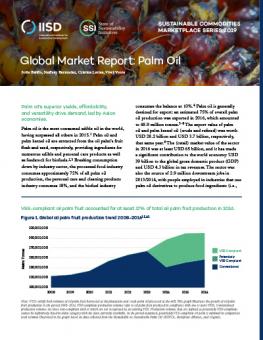
Global Market Report: Palm Oil
This report examines how voluntary sustainability standards can mitigate some of the worst environmental impacts of producing palm oil, the world’s most consumed edible oil.
Key Messages
- Palm oil producers are increasingly following voluntary sustainability standards (VSSs).
- VSS-compliance can mitigate some of the worst environmental and social impacts of palm oil production.
- The palm oil market is large and expanding, offering big potential for VSSs to have a positive impact.
Palm oil is the most widely used vegetable oil in the world. It is used in numerous edible and personal care products as well as feedstock for biofuels. However, palm oil production has been linked to deforestation and other negative environmental and social impacts.
This report, part of IISD's Sustainable Commodities Marketplace Series, examines the growth and potential for voluntary sustainability standards to mitigate some of palm oil production's worst environmental and social impacts.
Additional downloads
You might also be interested in
Fitting the Pieces of the Puzzle
Governments are adopting sustainability standards for global value chains (GVCs), but businesses in the Global South face challenges in meeting these evolving regulations.
Women Turning the Table on Food Loss and Waste in Kenya
A group of changemakers led a movement to tackle food loss and waste in Kenya. IISD experts have been working closely with local women leaders to make change happen.
Will the Inclusion of Voluntary Standards in Trade Agreements Lead to More Sustainable Trade?
The use of voluntary sustainability standards (VSSs) and similar systems in free trade agreements (FTAs) is gaining traction. Will it lead to more sustainable production and consumption globally?
Global Market Report: Soybean prices and sustainability
Less than 3% of soybeans are produced in compliance with sustainability standards. This report unpacks what needs to change to make soybeans a food that protects rather than harms the natural environment.